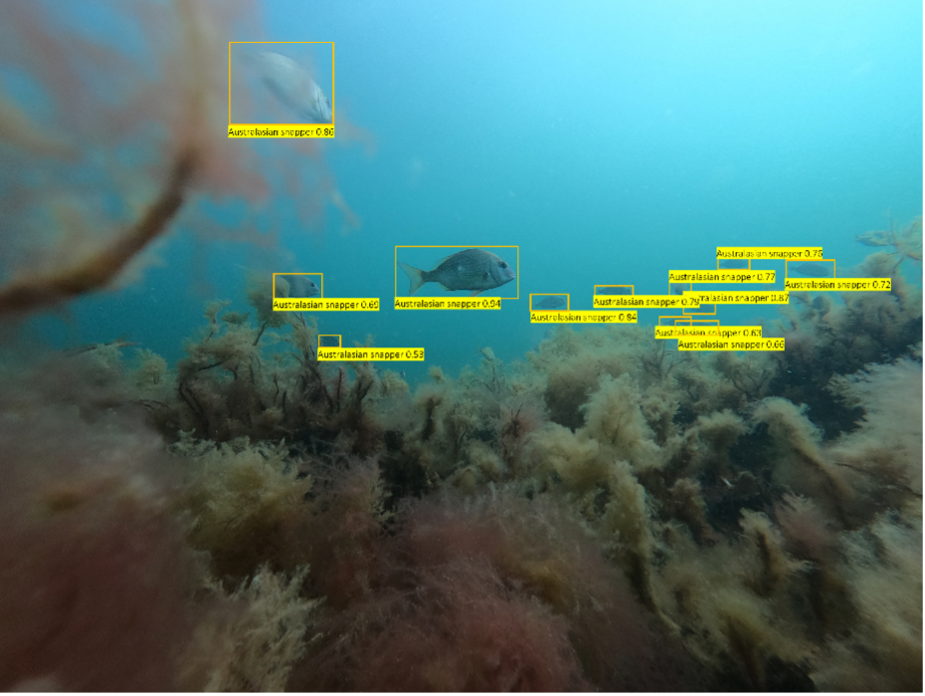Online seminars
In our monthly online seminar series we aim to show our achievements, brainstorm, share challenges and foster collaborations.
These seminars will be recorded and available online.
Mapping Energy Seascapes with AI-Powered 3D Multi-Object Tracking
October 30, 2024
Presenter: Julian Lilkendey, Leibniz Centre for Tropical Marine Research
AI-driven species recognition and tracking is advancing at breakneck speed. However, we are still lacking good training data for data-poor tropical regions and reliable location-invariant realtime 3D tracking methodologies. In my talk, I will focus on leveraging stereo-video to capture 3D fish trajectories, followed by AI-driven multi-object tracking to decode fish energy expenditure and behaviour. Specifically, we employed DeepSORT to track multiple fish in complex coral reef environments. To overcome training data scarcity, we integrated iNaturalist media, which provided diverse, real-world examples. During this process, I established best practices for incorporating community-science media into AI training, ensuring data quality and ethical use. This fusion of stereo-video, AI, and the use of photos identified by community experts enables precise and reliable calculation of metrics like field metabolic rates, and eventually the development of novel ethodiversity scores. These advancements contribute to the derivation of Energy Seascapes - models highlighting the energetic burden to life in certain habitats.
Turning fish and benthic annotations into State of the Environment reporting
June 18, 2024
Presenters: Brooke Gibbons and Tim Langlois, Global Archive
Brooke and Tim will be talking about their work with Global Archive to provide a portal for the discovery and sharing of stereo-video image annotation data of both marine fish and habitats.
They will present a set of open-access workflows and web app to help with the QAQC of fish biogeographic, abundance and length data and give examples of how this has benefited recent continental synthesis and national environmental reporting around Australia.
Some pre-reading for the seminar: Stereo-video workflows for fish and benthic ecologists

Update on the Fishial.AI project - Image Management, Species AI Model and Benchmark dataset
May 3, 2024
Presenter: Tom Wye, Fishial
Over the last three years the not for profit, Fishial.AI project has been developing a photo image content management system to assist in annotating fish species images and building a species segmentation and classification AI model in the recreational fish species space for anglers and divers. The model can currently identify 294 fish species.
Slides:
Overview of the Fishial project
Fish species identification model
Rapid improvements in fisheries monitoring with underwater computer vision
March 21, 2024
Presenter: Professor Rod Connolly, FishID (Director)
The application of automation using underwater computer vision is revolutionising fisheries science. Our use of automated data extraction on robust and inexpensive camera systems is providing a step-change in efficiency for monitoring fish. Working collaboratively with fisheries managers and conservation NGOs, we demonstrate how automation overcomes barriers to reliable monitoring in situations that until now have been difficult, dangerous, or prohibitively expensive. We highlight examples of stock assessments for benthic fisheries and surveys of fish abundance and size on restored habitats as a basis for environmental accounting.

FishID automated identification and counting of fish on restored shellfish reef
First meeting
The first online consortium meeting was held on June 30 (Friday) 2023 at 8am (East Australian time).
We discussed the main priorities and ideas for the consortium and had brief presentations from some consortium members about their work and interest, including:
- Andrew Jansen (Australian Government’s Supervising Scientist Branch): BRUVNet dataset and models for fish ID
- Dan Morris (Google): lessons from related domains and suggestions for the consortium
- Nathaniel “Than” Hitt (US Geological Survey): Individual fish identification models
- Catarina Silva (University of Coimbra, Portugal): Models for fish size classification from citizen science and social media photos
We also had a brief discussion on introducing specific goals and key priorities (building an image bank, testing models, combining models, expert fish identification in images, funding application) and people willing to help with them or lead them. Next meetings could be specifically targeted to just one of these goals b) computing resources that consortium could use. Is there any cloud computing available, can we apply for it? c) please provide materials (links, publications, your photo, your description, etc) for the website and let us know if you would like to help with building it. We have a dedicated domain which will soon replace the GitHub link. d) how to reach groups in Asia, Africa and South America? e) other topics